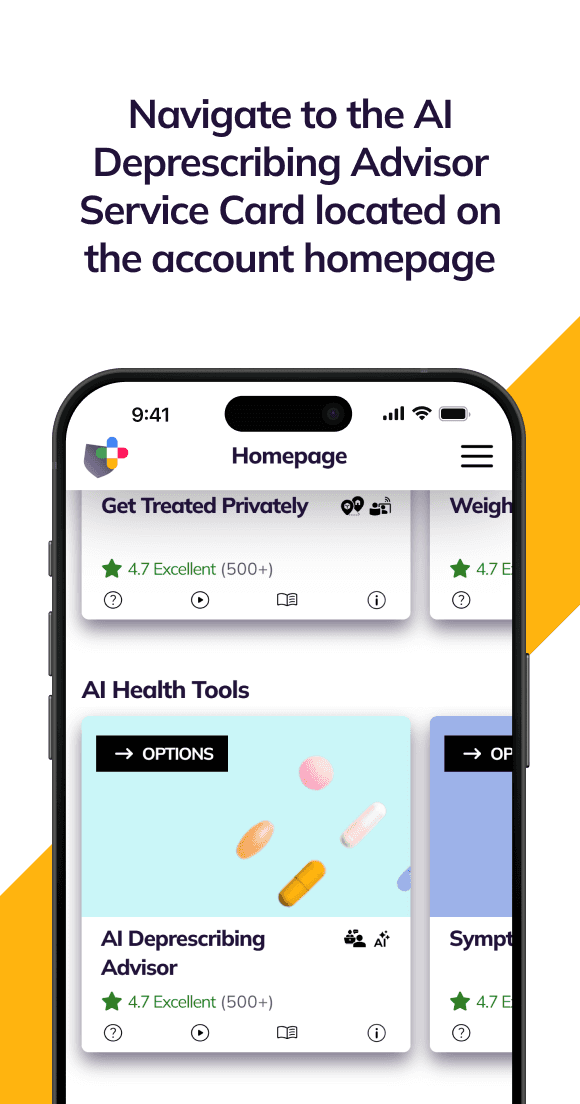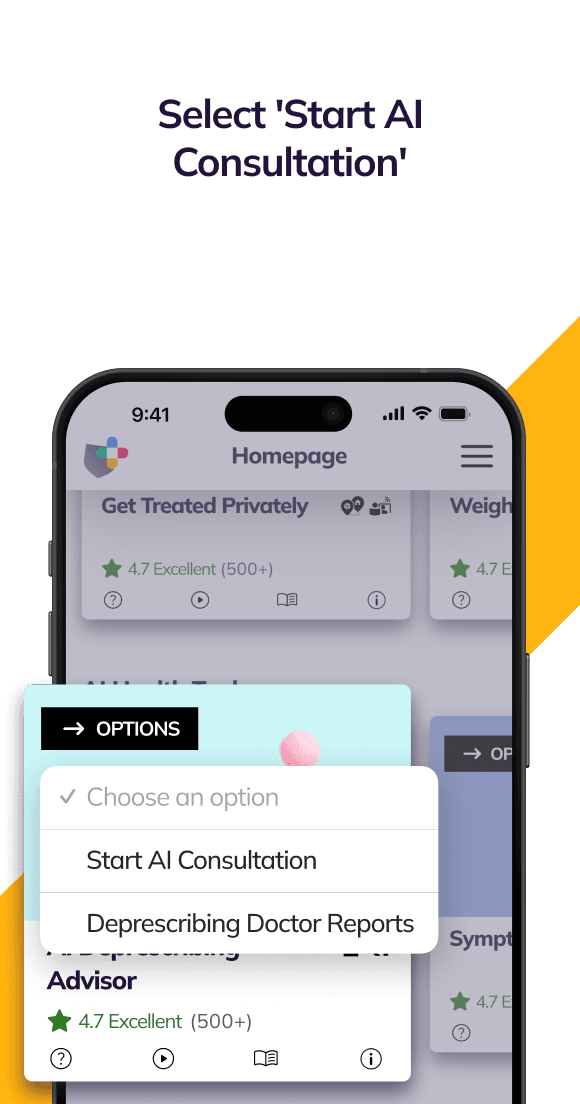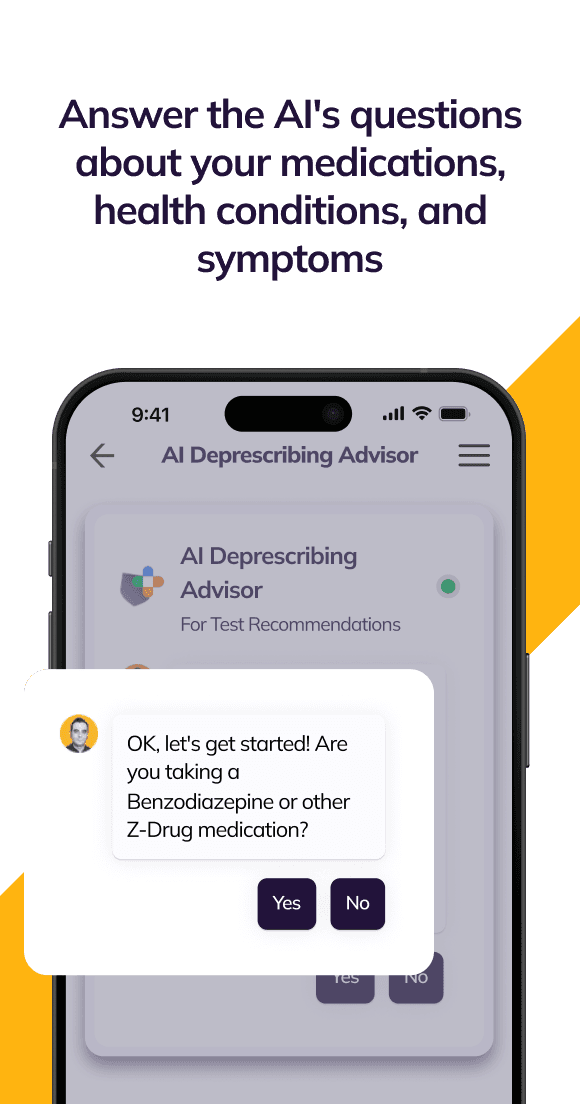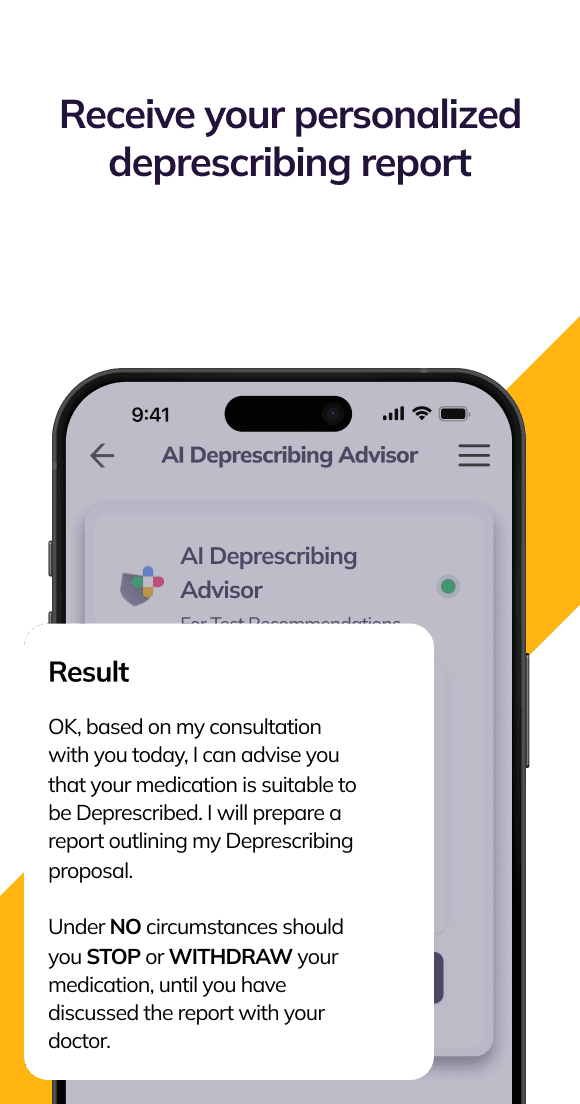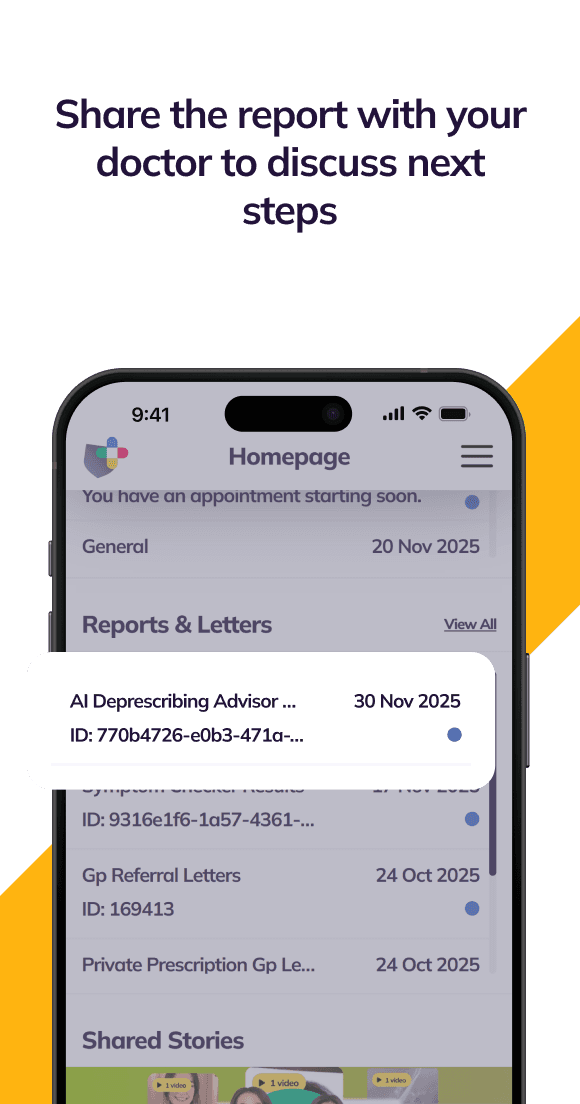How AI Deprescribing Advisor Works
Deprescribing is the safe and effective withdrawal of inappropriate medicines. Use the AI deprescribing advisor to generate a FREE comprehensive report identifying unnecessary or potentially harmful medications you’re taking.
The report provides your doctor with evidence-based protocols showing exactly how to safely reduce or withdraw medications.
See how Deprescribing can help you benefit from dose reduction or stopping your medication altogether
Smooth, simple, seamless
Your Guide to Using the AI Deprescribing Advisor App Feature
SERVICE GUIDE
Everything You Need to Know About the AI Deprescribing Advisor
What is Deprescribing?
Polypharmacy (the use of multiple medications simultaneously) affects millions of people worldwide. Medications are often started for legitimate medical reasons but may be continued long after they cease to provide meaningful benefit, or when they begin causing more harm than good.
Deprescribing is the systematic, evidence-based process of reducing or stopping medications that may no longer be beneficial or may be causing adverse effects. This carefully managed withdrawal is conducted under medical supervision and requires careful evaluation of each medication’s risk-benefit profile, consideration of drug interactions, assessment of withdrawal risks, and creation of individualized tapering schedules where necessary.
How does the AI Deprescribing Advisor work?
The AI Deprescribing Advisor represents a breakthrough in personalized medication management, leveraging advanced artificial intelligence to give you access to expert-level deprescribing guidance. The system utilizes natural language processing and machine learning algorithms trained on rigorous, peer-reviewed clinical deprescribing protocols from leading medical institutions.
Our AI has been meticulously trained on evidence-based deprescribing guidelines. The system doesn’t simply match keywords, it understands clinical context, recognizes medication interactions, identifies contraindications, and evaluates patient-specific factors that influence deprescribing suitability.
When you engage with the AI through its conversational interface, the system conducts a comprehensive clinical assessment by asking targeted questions about your medications, medical history, symptoms, and current health status. The AI adapts its questioning in real-time based on your responses, much like an experienced clinician would during a medication review consultation.
If the AI determines that your medications may be suitable candidates for deprescribing, it generates a comprehensive, physician-ready report with detailed evidence-based step-by-step deprescribing protocols including monitoring parameters and expected timelines.
Critical Safety Protocol: The AI Deprescribing Advisor is a decision-support tool, not a replacement for medical judgment. Under NO circumstances should you STOP or WITHDRAW your medication until you have discussed the report with your doctor.
Which medications can be Deprescribed?
The AI Deprescribing Advisor focuses on medication classes where robust, evidence-based deprescribing protocols exist:
Anticholinergic Medications – Often used for bladder control, allergies, or Parkinson’s disease, these can accumulate cognitive side effects over time, particularly in older adults.
Proton Pump Inhibitors (PPIs) – While effective for short-term acid reflux treatment, PPIs are frequently continued indefinitely. Long-term use carries risks including bone fractures, kidney disease, and nutrient deficiencies.
Anti-hyperglycemic Medications – Diabetes medications that may have been appropriate years ago might now be causing dangerously low blood sugar as health conditions evolve.
Antipsychotic Medications – Often prescribed for dementia-related behavioral symptoms or insomnia, antipsychotics carry significant risks in older adults including increased stroke risk and accelerated cognitive decline.
Benzodiazepine & Z-Drug Medications – These sleep and anxiety medications become increasingly risky with age, causing falls, confusion, and dependence.
Cholinesterase Inhibitors & Memantine – These dementia medications may lose effectiveness as the condition progresses while still causing side effects.
How do I get started with the AI Deprescribing Advisor?
Getting started is simple and takes just minutes:
- Navigate to the AI Deprescribing Advisor Service Card located on the account homepage
- Select ‘Start AI Consultation’
- Answer the AI’s questions about your medications, health conditions, and symptoms
- Receive your personalized deprescribing report
- Share the report with your doctor to discuss next steps
The entire process is designed to be intuitive and conversational. The AI guides you through each step, and you can complete the assessment at your own pace.
What are the benefits of Deprescribing?
Deprescribing can transform your health, wellbeing, and quality of life in ways that may surprise you:
Immediate Quality of Life Improvements: Taking fewer medications simplifies your daily routine, reducing the cognitive burden of managing complex medication schedules. Many people report feeling more “like themselves” after deprescribing medications that were causing subtle cognitive fog, drowsiness, or other side effects they had attributed to aging.
Physical Health Benefits: Deprescribing can reduce your risk of dangerous adverse drug reactions, which are responsible for millions of unplanned hospital admissions annually. Specific improvements include reduced dizziness and fall risk, improved kidney function, better bone health, enhanced cognitive function, reduced bleeding risk, and improved nutritional status.
Financial Benefits: Deprescribing can save substantial money for both you and the health system. This money could be redirected to healthier food, exercise programs, or other health-promoting activities.
Improved Medication Adherence: Taking fewer medications helps you take your other medications more reliably. By removing unnecessary medications, you increase your ability to consistently take the medications you do need, without the confusion of being overburdened with managing many medications.
Empowerment and Agency: Deprescribing puts you back in the driver’s seat of your healthcare. The AI Deprescribing Advisor gives you evidence-based information to have meaningful conversations with your doctor, transforming you from a passive recipient of prescriptions into an active partner in your care.
What evidence supports the AI Deprescribing Advisor's recommendations?
The AI has been trained on evidence-based deprescribing guidelines from internationally recognized medical institutions:
Anticholinergic (AC) Deprescribing – NSW Therapeutic Advisory Group, an initiative of NSW clinical pharmacologists & pharmacists.
Proton Pump Inhibitor (PPI) Deprescribing – Farrell B, Pottie K, Thompson W, Boghossian T, Pizzola L, Rashid FJ, et al. Deprescribing proton pump inhibitors: Evidence-based clinical practice guideline. Can Fam Physician 2017;63:354-64 (Eng), e253-65 (Fr).
Antihyperglycemics Deprescribing – Farrell B, Black C, Thompson W, McCarthy L, Rojas-Fernandez C, Lochnan H, et al. Deprescribing antihyperglycemic agents in older persons: Evidence-based clinical practice guideline. Can Fam Physician 2017;63:832-43 (Eng), e452-65 (Fr).
Antipsychotic (AP) Deprescribing – Bjerre LM, Farrell B, Hogel M, Graham L, Lemay G, McCarthy L, et al. Deprescribing antipsychotics for behavioural and psychological symptoms of dementia and insomnia: Evidence-based clinical practice guideline. Can Fam Physician 2018;64:17-27 (Eng), e1-e12 (Fr).
Benzodiazepine & Z-Drug (BZRA) Deprescribing – Pottie K, Thompson W, Davies S, Grenier J, Sadowski CA, Welch V, et al. Evidence-based clinical practice guideline for deprescribing benzodiazepine receptor agonists. Can Fam Physician 2018;64:339-51 (Eng), e209-24 (Fr).
Cholinesterase Inhibitor (ChEI) and Memantine Deprescribing – Reeve E, Farrell B, Thompson W, et al. Evidence-based Clinical Practice Guideline for Deprescribing Cholinesterase Inhibitors and Memantine. 2018. ISBN-13: 978-0-6482658-0-1
These guidelines represent the gold standard in deprescribing practice, developed through systematic reviews of clinical evidence and expert consensus processes.
Is it safe to use the AI Deprescribing Advisor?
Yes. The AI Deprescribing Advisor is designed with multiple layers of safety built into every aspect of its operation.
Medical Device Classification: The AI Deprescribing Advisor is classified as a Class I medical device under UK MDR 2002 regulations for its intended use. This means the system has been evaluated against stringent safety and performance requirements established for medical technology. As a regulated medical device, it must meet specific standards for reliability, accuracy, and patient safety that go beyond typical health apps or wellness tools.
Built-in Safety Features: The AI is programmed with conservative decision-making protocols that prioritize patient safety above all else. It will not recommend deprescribing where evidence is unclear, risks outweigh benefits, or insufficient information is available. The AI recognizes high-risk situations such as medications requiring slow tapering, conditions where abrupt discontinuation could be life-threatening, and complex medication regimens.
Physician Oversight Requirement: The AI functions as a clinical decision-support tool designed to facilitate informed conversations between you and your doctor, it does not replace medical judgment or prescribing authority. Every report explicitly states that medication changes should only be made under medical supervision by a qualified healthcare professional.
Evidence-Based Foundation: By basing all recommendations exclusively on peer-reviewed, evidence-based clinical guidelines, the AI provides recommendations grounded in the best available medical science.
How will I get my results?
Once you complete your AI consultation, the system generates a comprehensive deprescribing report tailored specifically to your situation.
Accessing Your Report: Your personalized deprescribing report will be available in the ‘Reports & Letters’ section of your NowPatient account homepage. You can access this section at any time to view, download, or share your report. Alternatively, you can navigate to the ‘AI Deprescribing Advisor’ Service Card and select the option ‘Deprescribing Doctor Reports’
What’s Included in Your Report:
- Summary of the AI Consultation: Overview of the assessment process, medications reviewed, and key factors evaluated
- Clinical Rationale for Deprescribing: Detailed explanation of why deprescribing is recommended, including current risks and benefits, patient-specific factors, and potential health benefits
- Evidence-Based Deprescribing Protocol: Step-by-step instructions for your doctor detailing how to safely reduce or withdraw medications, including specific tapering schedules, monitoring parameters, timeline, warning signs, follow-up recommendations, and alternative treatment options
- Supporting Clinical Evidence: Citations and references to peer-reviewed deprescribing guidelines
- Patient-Friendly Summary: Plain language sections so you can understand what’s being recommended and why
Sharing with Your Doctor: The report is designed to be shared directly with your healthcare provider. You can download the report as a PDF, email it to your doctor’s office, print a copy to discuss during your consultation, or share it through your healthcare provider’s patient portal.
Will my doctor listen to recommendations from an AI?
The AI Deprescribing Advisor generates reports that speak the language of clinical practice. Your doctor receives a professionally formatted document that includes:
- Specific clinical evidence citations from peer-reviewed guidelines
- Detailed rationale explaining why deprescribing is appropriate in your case
- Step-by-step protocols for safe medication withdrawal or dose reduction
- Monitoring parameters and safety considerations
- Expected outcomes and timelines
Physicians appreciate evidence-based tools that save them time and provide clear clinical pathways. Rather than needing to research deprescribing protocols themselves, they receive a ready-made plan based on authoritative guidelines. Many doctors welcome patients who take an active, informed role in their care.
The report empowers you to have a productive conversation with your doctor, backed by the same clinical evidence they rely on in their practice.
What if the AI recommends deprescribing but my doctor disagrees?
This is a healthy part of shared decision-making. Your doctor knows your complete medical history, including factors the AI assessment may not fully capture. There may be valid reasons why continuing a medication is appropriate in your specific case, even if general guidelines suggest deprescribing.
The AI Deprescribing Advisor is designed to start conversations, not dictate treatment decisions. If your doctor has concerns about the AI’s recommendations, ask them to explain their reasoning. This dialogue often leads to productive discussions about your treatment goals, medication benefits and risks, and alternative approaches.
You might also consider seeking a second opinion if you feel your concerns about medication burden aren’t being adequately addressed. The AI-generated report can be valuable when consulting with another healthcare provider.





